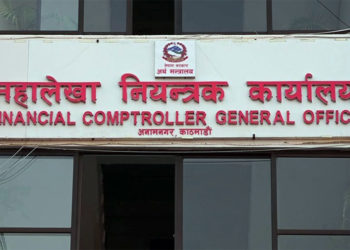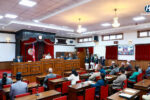KATHMANDU: Economic Digest offers a concise yet comprehensive overview of significant business happenings in Nepal, presented in easily digestible summaries.
Nepal’s recent economic and infrastructure developments reveal a dynamic but uneven landscape. The Nepal Stock Exchange showed robust investor optimism with a 40-point gain, fueled by declining margin loan rates and renewed interest in undervalued stocks.
Concurrently, the Bheri Babai Diversion Project nears completion, promising significant irrigation and energy benefits, while the Narayangadh-Butwal road expansion makes tangible progress.
However, critical projects like the Suryabinayak–Dhulikhel road face delays, underscoring bureaucratic and logistical challenges. Kathmandu’s alarming air pollution crisis exposes governance and enforcement weaknesses in environmental protection.
On the trade front, US tariffs threaten traditional exports like carpets and pashmina, even as India’s recognition of Nepali food lab tests offers a much-needed boost for agri-exports.
Socially, tourism in Bhedetar and Namje is rebounding post-COVID, and a thrift culture is emerging as citizens adapt to economic pressures. Regulatory crackdowns—from electrofishing fines to public naming of rent defaulters—highlight a growing assertiveness in local governance.
Together, these developments reflect both resilience and structural fragilities in Nepal’s evolving economic narrative.
NEPSE gains 40 points as investors buy undervalued shares
The Nepal Stock Exchange (NEPSE) index rose by 40.09 points last week, closing at 2,703.39, buoyed by investor interest in low-priced stocks. Market fluctuations ranged between 2,654.57 and 2,732.85, with a total volatility of 78.28 points.
The trading index jumped 11.43%, though the manufacturing sector dipped 2.40%. Turnover increased by 4.89% to Rs 26.65 billion, and market capitalization surged by Rs 67 billion. Radhi Bidyut Company led the gains, while Bottlers Nepal suffered the biggest drop.
Narayangadh-Butwal Road Project completes 29 bridges
As part of the Narayangadh-Butwal road expansion, 29 bridges in the eastern section have been completed. Only five remain under construction, including major bridges at Jai Shree and Beldiya.
A new bridge over the Binayi River is being prioritized following the collapse of the previous structure and is expected to finish by the first week of Jestha. Funded by the Asian Development Bank, the full project is on track for completion in the near future.
AQI peaks, toxic smog engulfs Kathmandu
Kathmandu Valley is currently facing extreme air pollution, with the Air Quality Index (AQI) soaring to 348—classified as hazardous. Experts attribute this spike to weak wind patterns, forest fires, and agricultural residue burning.
The Ministry of Health has issued warnings about severe health risks, particularly for children, pregnant women, and those with chronic illnesses.
Medical professionals advise minimizing outdoor exposure and using protective masks. Environmentalists are calling for a public health emergency declaration, while rights advocates argue the crisis violates citizens’ right to clean air. Despite having air quality management policies, enforcement remains ineffective.
Margin loan rates drop below 10% across major banks
Interest rates for share mortgage (margin) loans have fallen to single digits at most Nepali banks in Chaitra, sparking renewed interest in stock market investments. With abundant liquidity and falling base rates, banks are offering loans at a modest 2% premium above their base rates.
Rastriya Banijya Bank offers the lowest rates at 6.28%–7.28%, with banks like Everest, Krishi, and Global IME also offering sub-9% rates. Margin lending has grown by 27.8% this fiscal year, reaching Rs 115 billion. Experts expect this trend to continue as investor confidence strengthens.
Bheri Babai Diversion Project hits 83% completion mark
Initiated in fiscal year 2014/15, the Bheri Babai Diversion Project has reached 83.7% completion. This major infrastructure initiative is designed to channel water from the Bheri River to the Babai River, enhancing irrigation across 51,000 hectares in Banke and Bardiya districts.
Despite setbacks in land acquisition, key infrastructure such as tunnels and dams is nearly finished. The project also features a 46 MW hydroelectric component, expected to significantly boost both agriculture and energy supply upon completion.
US tariff on Nepali exports to hit carpet, Pashmina
A newly announced 10% customs duty by the United States on Nepali imports is set to impact key sectors such as carpets, pashmina, and handicrafts. The Nepal Carpet Producers and Exporters Association fears a loss of competitiveness, especially since carpets make up 60% of U.S.-bound exports.
The pashmina sector also anticipates cost increases. However, the garment industry may see limited benefits due to comparatively lower tariffs than competitors.
Fog grounds Lukla flights; over 250 tourists stranded in Manthali
Dense fog has halted flights between Manthali and Lukla, stranding more than 250 tourists—mostly foreigners and their guides—at Manthali Airport. While five flights operated Thursday morning, worsening visibility in the Khumbu region has since grounded all aircraft.
Many travelers have turned to helicopters; over 100 reached Lukla and Phaplu via air charter on Friday. Seasonal flights from Manthali are common during peak trekking seasons.
Provident Fund distributes over Rs 5 billion in profits
The Employees Provident Fund (EPF) has distributed Rs 5.34 billion in profits to its members for the last fiscal year. Of this, Rs 5.27 billion went to provident fund holders and Rs 64.3 million to retirement fund contributors.
EPF offered a 5.50% interest rate, along with a 1.10% additional profit share—bringing total returns to 6.60%. The fund continues to offer benefits including loans, health coverage, and social grants.
Minister urges boost in exports to narrow China trade gap
Minister for Industry, Commerce, and Supplies Damodar Bhandari stressed the importance of increasing exports to China to address Nepal’s widening trade deficit.
Speaking at the 25th anniversary of the Nepal Himalayan Cross-Border Commerce Association, he promoted exports of herbal goods, handicrafts, and agricultural products.
Government efforts include participation in trade expos, easing forex rules, Chinese language training, and infrastructure improvements at border crossings like Tatopani and Rasuwagadhi. The minister called for stronger public-private collaboration to attract investment and enhance trade diversification.
India recognizes Nepali food lab tests
India has agreed to accept food quality test reports from Nepal’s National Food and Feed Reference Laboratory (NFFRL), ending the need for Indian testing. Approved by India’s FSSAI and NABL, this decision applies to ten product categories, including tea, honey, dairy, and spices.
This move eliminates significant export delays and costs—previously up to NPR 50,000 and one month per test—boosting Nepal’s competitiveness in the Indian market.
Suryabinayak–Dhulikhel road expansion delayed; only 40% complete
The six-lane upgrade of the Suryabinayak–Dhulikhel segment of the Araniko Highway is behind schedule, with just 40% of work completed. The 16-km project, launched in December 2022 with a 36-month deadline, is hampered by delays in demolishing structures, moving utilities, and settling land disputes.
In urban areas like Banepa, these issues are more pronounced. Officials project that only 65% of physical work will be completed by the original deadline, making an extension necessary.
Tourism soars in Bhedetar and Namje as homestays flourish
Tourism is booming in Bhedetar, a hill town in eastern Nepal, especially among Indian travelers. The town boasts around 200 hotels and hosts an annual food festival. Nearby Namje, famous for its Magar heritage and homestay experiences, was recognized by CNN as a unique global destination.
With post-pandemic recovery underway, regional investments—such as the Indigenous Park—are supporting tourism growth and revitalizing local economies.
51 rent defaulters named for Bhaktapur Mandap Properties
The Social Welfare Council has publicly disclosed a list of 51 individuals and organizations that have failed to pay rent for property in Bhaktapur Mandap, Kathmandu.
Notable defaulters include the Nepal Tourism Board (over Rs 16.7 million owed) and Reporters Club, led by journalist Rishi Dhimal (Rs 4.65 million). Despite multiple notices, payments remain overdue. Legal action is threatened if dues are not cleared promptly.
Sabhapokhari fines electrofishing
Sabhapokhari Rural Municipality in Sankhuwasabha has introduced strict penalties for electrofishing, with fines reaching Rs 100,000 in protected rivers such as Sabha Khola and Langkhuwa Khola.
Traditional fishing methods using nets and hooks are also penalized up to Rs 50,000. Offenders will be apprehended with police assistance, with 15% of fines awarded to officers and 5% to informants. Legal action will follow if fines go unpaid.
Thrift shopping trend grows in Nepal
Thrift shopping is gaining momentum in urban centers like Kathmandu, Lalitpur, and Pokhara as more people turn to affordable second-hand goods amid rising living costs.
Inspired by global trends and driven by sustainability, the practice is thriving on online platforms like “Hamarobazar” and “Meromarket.” The movement not only promotes frugality but also reduces environmental impact, resonating especially with younger generations.
Khukuri Rum set for Indian production backed by MSKETI Beverages
Khukuri Rum, a renowned Nepali liquor brand, will begin production in India through investment from Singapore-based MSKETI Beverages. Production, set to start by 2026, aims to initially produce 20,000 cases across three rum variants, featuring flavors like caramel, vanilla, and Himalayan herbs.
Since its inception in 1959, Khukuri Rum has become a symbol of Nepali heritage and has received multiple international awards.









Comment